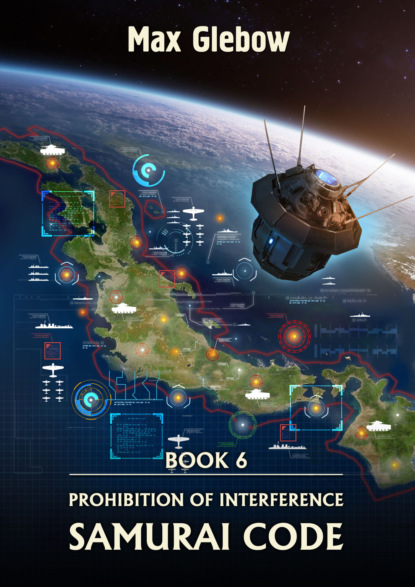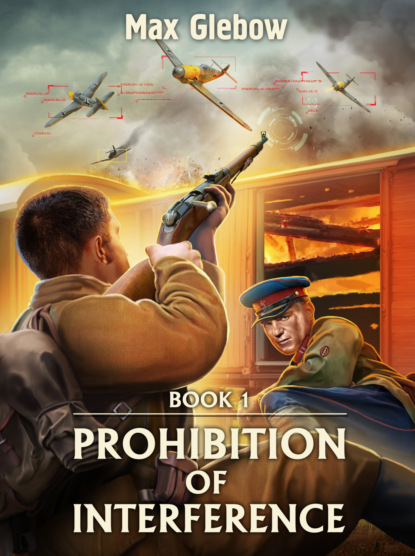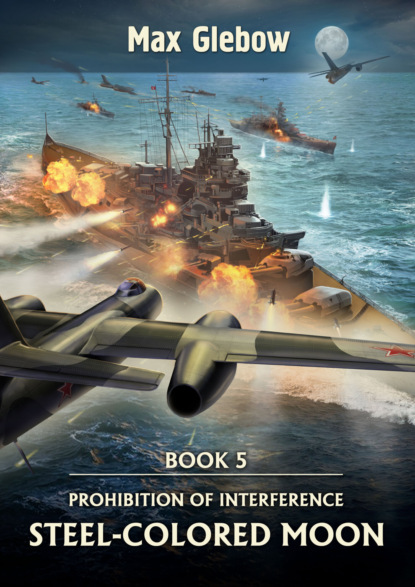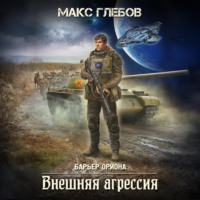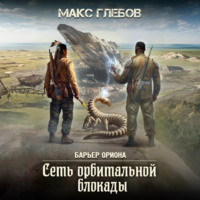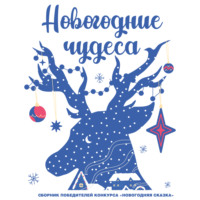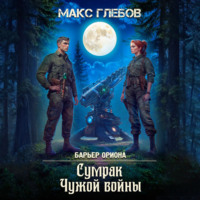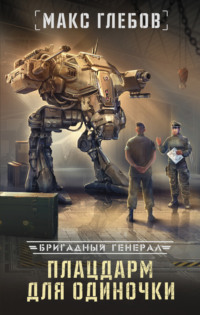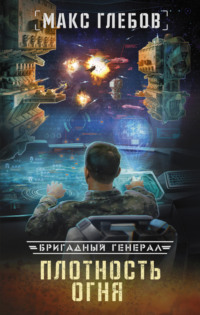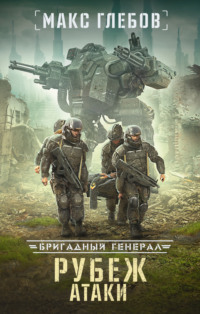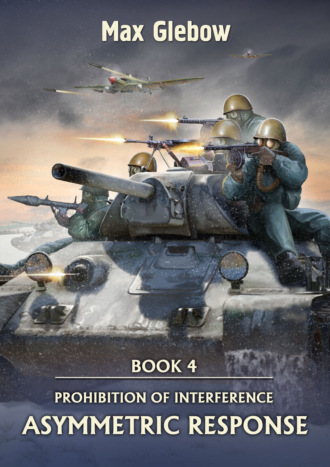
Полная версия
Prohibition of Interference. Book 4. Asymmetric response
“"Mole", this is "Viper 2". We got the information. Awaiting instructions.”
“You will not have time to change positions – you will be caught on the march. Prepare to repel the attack. 52-K cannons, take data for barrage fire. Small-caliber guns open fire at visual contact with the enemy.”
There was nothing else I could do to help the anti-aircraft gunners. My command post was almost a hundred kilometers away from their positions, and I could only watch the unfolding battle from orbit with clenched fists.
This group of dive bombers was clearly set up beforehand by the enemy. Apparently, the Germans again managed to predict my actions to some extent. In any case, they were clearly preparing in advance to foil the attempt to destroy the air bridge to the Moscow Pocket. But have they chosen the right means to do so? The decision to send dive bombers to attack an air defense area that is loaded with automatic cannons is quite controversial. There will inevitably be casualties on both sides, and they will be significant losses. Judging by the way the Germans approach the target, the Luftwaffe have not assembled a strike group of rookies, and I do not understand why the Germans are willing to risk their best pilots so much.
I didn't count much on the effectiveness of the 85 mm guns barrage fire. Nevertheless, as soon as the German planes crossed the invisible 15-kilometer line to the anti-aircraft positions, the 52-K guns sent 16 fragmentation shells toward them in a volley, to at least disrupt the formation and make the enemy pilots nervous.
In the three minutes it took the German planes to reach the anti-aircraft guns, the battery managed to make two dozen salvos. Theoretically, they could have fired faster, but the Germans were changing course, maneuvering, and this required the anti-aircraft gunners to constantly adjust their sights. To my surprise, their efforts were not wasted – two dive-bombers crashed into the forest and disappeared in the fiery flashes of detonated bombs.
The Messerschmitts were the first to attack. 12 planes, armed as fighter-bombers, swiftly jumped out from behind the trees of the nearest grove and dropped dozens of small fragmentation bombs on the anti-aircraft positions. However, the appearance of the enemy did not come as a surprise to the automatic gun crews; they had received advance warning of the impending attack, as well as information about the direction from which the attack was expected to come.
Fire trails stretched toward the Messerschmitts, they immediately crossed two planes and forced the other five fighters off their combat course. German planes flew low over gun positions, firing machine guns and dropping bombs. Shrapnel howled through the air and collected its deadly tribute, but the cannons were in the trenches, and this partly reduced the effectiveness of the bombardment. The barrels of the guns turned after the fighters coming out of the attack. One plane exploded in mid-air, two others were damaged and had to withdraw from the battle.
The attack by the Messerschmitts was only a prelude. Almost immediately after them dive bombers appeared over the anti-aircraft positions. They had to gain altitude first to approach the targets, which took some time, so their strike followed later than the fighters' attack. But now three dozen Junkers were falling almost steeply on the heads of the anti-aircraft gunners, and there was a terrifying howl in the air.
Some dive-bombers exploded in midair, tumbling down on the anti-aircraft trenches without dropping their deadly cargo, but most of the bombers still managed to break through the heavy fire and drop their bombs.
The density of anti-aircraft fire had decreased noticeably, but the air defense positioning area was still far from being destroyed when I saw something, that made me clench my fists to the point of pain. The computer sounded an alarm and illuminated the clouds of whitish fog rapidly spreading out from the bomb sites with a flashing orange light. On the left, at the edge of my field of vision, a chemical formula and a brief note about the gas used by the Germans popped up. It was something no country in the world had ever used before. No mustard gas, cyanogen chloride, lewisite, phosgene or adamsite. Sarin! It is a terrible nerve gas, which affects the nervous system, makes muscles involuntarily contract, causing respiratory arrest and a total loss of control over all bodily functions.
Where the clouds of gas spread over the ground, the fire of the anti-aircraft guns that had survived the bombs subsided instantly, and by the time the remaining 19 dive bombers began their second approach to their targets, only the individual small-caliber guns were firing on them, those had not yet been reached by the gas clouds.
“"Mole", this is "Viper 2". We are being attacked by unknown war gases! We've lost mid-caliber gun crews. The sticky slurry…”
Four minutes into the attack, fire from the ground ceased completely. In the freezing no-wind conditions, the entire position of the anti-aircraft gunners was covered with swirling clouds of poisonous fog that drifted into the trenches and dugouts, leaving no chance of survival for anyone who fell into the zone of chemical contamination.
“"Viper 2", respond to the "Mole"!” The on-duty communicator kept calling the anti-aircraft gunners.
“Stand down, Staff Sergeant, they won't answer,” I stopped the radio operator in a hoarse voice, “I need a connection with the General Staff. Now!”
It didn't work immediately, but about ten minutes later I heard Shaposhnikov's concerned voice on the phone: “Report, Lieutenant Colonel.”
“Comrade Marshal, what I warned you about happened. The Viper 2 position area was attacked by dive bombers armed with chemical bombs. I'm afraid no one survived there. Apparently, this is something new. Gas masks don't help much, although I don't think many people had time to put them on.”
Shaposhnikov was silent, and I tried to answer myself the simple question, "why did the Germans hit the anti-aircraft gunners with toxic chemicals?"
There was only one answer – they really wanted to get me, and if I was really in position with the 85 mm guns, they probably would have succeeded. Even my body could not cope with such a dose of nerve poison, especially in a situation where there was no one to get me out of the contamination zone. By using sarin gas, the enemy revealed their plans ahead of time, but apparently the Germans thought the goal was worth it.
Chapter 3
“How did the British and USA ambassadors respond to our appeal?”
“They expressed great concern, Comrade Stalin,” Soviet Foreign Minister Molotov grimaced irritably, “they promised to tell us the position of London and Washington as soon as possible. There seems to be little hope for the Americans. After the Japanese hit Pearl Harbor and the Imperial Army landed in the Philippines, they are, to put it mildly, not interested in us. Apparently, it was feared that once the war with the Samurai had begun, Germany would declare war on them, but so far this has not happened, and Roosevelt certainly will not want to provoke Hitler[1].”
“With the current situation at Moscow and the beginning of the British offensive in North Africa, all Hitler needed was a war with the United States,” Stalin's voice sounded irritated. “Roosevelt's apprehension is misguided, though it may only be an excuse for denying us effective help. And what do you, Comrade Molotov, think about the prospects of Britain entering chemical warfare?”
“It's more complicated here, Comrade Stalin. The Germans lost the air battle for Britain, but it is unlikely that Churchill would want to expose his cities to the risk of chemical bombing. By drawing off the tank units of the African Corps, we have greatly relieved the situation of the British in Egypt and Libya, and now Churchill is in a hurry to turn the course of the war in Africa in his favor. He does not need any new problems, especially in view of the Japanese attack on the port of Hong Kong and the emergence of a real threat to Singapore and all of British Malaya. On December 10, the British fleet lost in the South China Sea the battleship Prince of Wales and the battlecruiser Repulse. This victory cost the Japanese only three planes, so the British and Americans have enough to worry about. It is possible that they can ask us for help themselves[2] – now they are in a situation similar to ours in June.”
The Chief nodded slowly and switched to another topic:
“After the gas attack on anti-aircraft positions near Vyazma, are there any other facts of the use of chemical weapons by the Germans?”
“No, Comrade Stalin,” Zhukov entered the discussion, “but the intelligence data is very disturbing. All the signs of the enemy's preparation for combat operations in chemically contaminated areas are there.”
“How ready are we for this?” Stalin shifted his gaze to Shaposhnikov.
The Chief of the General Staff did not embellish the real situation:
“Now the enemy is way ahead of us in means of chemical defense, but work is being done. All the necessary orders were issued immediately after the discussion at the Headquarters of the Supreme High Command of Lieutenant Colonel Nagulin's conclusions about the threat of the Germans' use of chemical warfare agents.”
“The name Nagulin has come up too often in this office,” the Chief grinned indefinitely, “do you not think so, comrades?”
“Given his role in key events at the front, it doesn't look like anything special,” Shaposhnikov answered cautiously.
“Perhaps,” Stalin nodded, “however, the results of his actions against the Luftwaffe air bridge do not yet look as impressive, as the previous operations, although some successes definitely exist.”
“Hardly anyone else in his position would have done better,” Zhukov, usually skeptical to all the endeavors of Nagulin, whom he did not quite understand, suddenly stood up for him. “The enemy's opposition is too great, and our resources are extremely limited.”
Stalin did not seem to expect such words from Zhukov either, and he was somewhat surprised at the unanimity of the commander of the Western Front and the Chief of the General Staff.
“When will Kleist strike?” The Chief suddenly changed the subject, temporarily "forgetting" about Lieutenant Colonel Nagulin.
“Perhaps as early as tomorrow, Comrade Stalin,” Zhukov answered after a short pause. “In two days at the most.”
* * *Göring's "air bridge" crackled and swayed, but it had no desire to finally collapse. I gave the Luftwaffe a lot of trouble, but the forces and means at my disposal were still clearly insufficient, and I had nowhere to get additional forces and means.
The Germans quickly realized that flying in tight formation at maximum altitude would be suicide and immediately abandoned this tactic. The enemy was in no hurry to repeat the attacks on the air defense positions. Apparently, the losses made a great impression on the Luftwaffe command, and it was not prepared to lose aircraft and, more importantly, qualified pilots, at such a rate. Nevertheless, the very fact of the chemical attack on anti-aircraft positions forced us to take emergency measures.
We had to train anti-aircraft soldiers to fire in gas masks and anti-mustard gas capes, which had a big impact on their rate of fire and, consequently, on the results of their firing. This was clearly insufficient for protection against sarin, but no other means were available to the Red Army chemical troops anyway.
In a way, I was even glad that the enemy started using chemical weapons immediately with the most dangerous gas. This enabled me to tell Shaposhnikov categorically that if Soviet industry did not immediately master the production of general-purpose hazmat suits immediately, we would have no chance of winning the chemical war. At that time the army had only a few hundred general-purpose hazmat suits, and they were mainly made on the basis of fabric soaked in drying oil, which gave very conditional protection against serious poisonous substances.
Unlike me, neither Stalin, nor Shaposhnikov, nor the rest of the Soviet military commanders knew that Hitler no longer had sarin, nor the industrial capacity to produce it. I was in no hurry to inform them of this encouraging fact – why should I deprive the country's leadership of such an excellent incentive to improve chemical defense?
I looked at what had already been done in this direction at home and in the world, and turned to Shaposhnikov with a proposal to use for mass production of hazmat suits the double rubberized fabric SK-1, developed five years ago. This time the Chief of the General Staff was not at all surprised that I was again trying to solve such problems through him; he took away my folder with the documentation on general protective suits and sent me back to Vyazma to continue to carry out the task of the Headquarters of the Supreme High Command to counteract the supply of German troops in the Moscow Pocket.
When convinced that the chemical attack had destroyed one anti-aircraft unit but had not solved the problem of beating the Junkers, the Germans tried to switch to the tactics of night flights. It did not bring them any success. Clear, frosty nights allowed me to target German transport planes with our night fighters, as the Il-2 ground-attack planes were quite unexpectedly quite good. Their speed was quite enough to fight the slow-moving transport planes, and their powerful armament and good armor made it possible not to fear the return fire of the Junkers.
Despite the losses, the Luftwaffe did not give up the idea of an air bridge. The transport planes were now flying at low altitudes during the day, trying to break through to the surrounded troops by single planes or in small groups. I found it more difficult to counter this tactic because there were too many targets in the sky at once, especially considering the numerous Messerschmitts that were trying to be everywhere at once, to prevent Soviet fighters from hunting down Junkers and Heinkels.
With this arrangement, the air defense position areas were no longer needed, and I again distributed the anti-aircraft artillery more or less evenly throughout the western part of the encirclement ring. In fact, I did everything I could. The Germans lost almost three hundred transport planes in four days. The flow of cargo to the Moscow Pocket was cut in half and continued to decline. There was nothing more for me to do here, but the order that had been given to me had not yet been cancelled. I got ready to wait, but the adversary decided everything for me.
Having weighed the pros and cons one last time, Ewald von Kleist came to the conclusion that there was no point in dragging it out further. On reduced rations the Army Group Center was growing weaker and weaker every day in the Moscow Pocket, and all that the Führer could allocate to strengthen the First Panzer Group, Kleist had already received.
On December 21, five tank and three motorized divisions of the Wehrmacht took the offensive north of Vyazma. Before the attack, the Führer's address was circulated to the troops:
"Soldiers, 150 kilometers of frozen land lie before you, which the Russian armies are holding on to with the last of their strength, and beyond this land are your comrades, who are waiting for help and believe in your unbreakable fighting spirit! This time you have only one way – to go ahead and win! The time has come to cast aside all the restrictions that our enemies tried to impose on us in pre-war times. We have weapons capable of overturning the Bolshevik hordes and reversing their movement, and we will use them here and now! You will celebrate Christmas together with the heroic soldiers of Army Group Center!"
I saw tanks, assault guns, armored personnel carriers, and artillery moving into forward positions at night. The Germans took into account the lessons of November and tried not to create areas with a high concentration of troops. There was nothing I could do about it – the order of the Headquarters of the Supreme High Command bound me hand and foot, but in the evening of December 20 I still could not resist and called Shaposhnikov.
“Comrade Marshal, the Germans will take the offensive tomorrow at dawn. The main blow will be struck on the Holm-Zhirkovski-Gzhatsk line. Auxiliary strikes will take place near Vyazma and Rzhev. Artillery preparation will be combined, using chemical and conventional shells. In the direction of the main attack the enemy will use only volatile gases that do not linger on the ground, so that they themselves do not suffer from their own toxic chemicals during the attack. It is most likely to be phosgene and cyanogen chloride, the latter being more likely, as it has a shorter period of latent action and old-style gas masks are ineffective against it. The Germans have few infantry, and will make extensive use of persistent poisonous substances to cover the flanks of the breakout – various mixtures of mustard gas and lewisite.”
There was silence on the phone for a few seconds.
“Comrade Nagulin, is this intelligence data or your own analytical conclusions?”
I could hear the tension in Shaposhnikov's voice.
“Analytical conclusions, Comrade Marshal.”
There was another pause in the conversation.
“Are you absolutely sure you weren't wrong in your inferences?” asked the chief of general staff, not trying to hide a heavy sigh.
“Absolutely.”
“What about sarin?”
“There might be sarin, but it is unlikely to be in large quantities.”
“I heard you, Lieutenant Colonel. If your information is confirmed, be ready to leave for Moscow immediately. Wait for the order.”
* * *The outer front of the encirclement collapsed and crumbled like a house of cards. I was afraid of something like that, but I still wasn't expecting such a crushing effect. When von Kleist got his hands on the new weapon, he decided to use it to its full capacity in order to maximize the effect of surprise, although it was somewhat marred by the Abwehr's botched operation with sarin bombs.
Kleist was supplied with an abundance of chemical munitions, of all types, for every conceivable purpose, and an hour before dawn the Wehrmacht began its first massive use of chemical warfare agents in this war.
Heavy howitzers and aviation were the first to engage. Thousands of high-explosive shells and bombs, among which were many munitions filled with phosgene and cyanogen chloride, hit the front lines of the two infantry divisions of the Kalinin Front.
Combat gases quickly dispersed over the area, poisoning those Red Army soldiers who did not have time to put on gas masks. Of course, after the order of the Headquarters of the Supreme High Command and especially after the gas attack on the anti-aircraft gunners, the readiness of the Soviet troops for chemical warfare was increased, but the fighters, who had never used gas masks in combat before, did not have time to react to the danger in time. Many soldiers' gas masks were ill-fitted or faulty, or in some cases were simply missing.
The death of comrades from bullets and shrapnel was a familiar sight for the Red Army men during the past six months of the war, but death by poisoning was something completely different, previously unseen and terrible. By the time the German attack began, the morale of Soviet fighters was, to put it mildly, not at its best. In some places there was outright panic, and the German tanks, which had taken the offensive, broke through the first line of defense almost without resistance.
Only the Soviet troops in the central section of the breakthrough were attacked by flying gases, which practically never stayed on the ground and quickly dissipated even by a light wind. On the flanks the Germans used a completely different tactic. Mustard gas and lewisite in the form of special winter mixtures were used here to keep these poisonous liquids from freezing in the cold.
In addition to bombs and shells, German bombers made extensive use of airborne spray devices, creating wide swaths of contaminated terrain behind the flying planes. The dominance of Luftwaffe fighters in the air and the fact that the air defense assets were disorganized by the chemical attack did not allow the Soviet side to stop these actions, and zones of chemical contamination, impregnated with skin-explosive poisons, formed on the flanks of Kleist's tank group rushing forward.
To protect against mustard gas and lewisite, a gas mask is not at all sufficient. Their main target is the skin of enemy soldiers. The Red Army men who were attacked had anti-mustard gas capes in their kit, but their effectiveness in real combat conditions was extremely low, especially in the case of the combined use of chemical weapons and conventional ammunition.
Any meaningful resistance in the infected areas was out of the question. Surviving fighters were eager to leave as quickly as possible the area that had been chemically attacked, and they left their positions without orders. However, the Germans, too, were in no hurry to occupy the trenches left by the Red Army. Their goal was quite different – to prevent Soviet counterstrikes under the base of the ledge, which was formed as a result of the breakthrough of the front and the development of the offensive by German tank divisions.
Wehrmacht infantry divisions occupied positions on the flanks of the tank formations that had gone forward, they fortified on the borders of territories flooded with mustard gas and lewisite and covered them with fire, preventing the Soviet chemical troops from decontaminating the terrain.
After breaking through the first line of defense, two regiments of Nebelwerfers concentrated behind the back of the advancing German troops. For the first time these multiple rocket launchers were used for their direct purpose – to fire chemical munitions.
The second and third lines of defense were broken by German tanks by mid-day. Here the resistance of the Soviet troops was more stubborn, but still could not stop the enemy offensive. The tactics chosen by Ewald von Kleist was bringing success to his divisions.
* * *I arrived in Moscow four hours after the German offensive began. Shaposhnikov decided not to wait for me to get there on my own and sent a plane for me. Judging by the gloomy appearance of the Chief of General Staff, the Headquarters of the Supreme High Command was in a depressed mood.
“You were right again, Lieutenant Colonel,” the Marshal began without preamble, “You gave the exact time and place of the strike by Kleist's tanks, as well as the methods of the enemy to use chemical weapons.”
“Was it possible to stop the enemy?” I asked a direct question, knowing full well the answer.
“Kleist's tank and motorized units advanced 30–40 kilometers and continue to press our troops,” Shaposhnikov said softly and turned to the map. “The two rifle divisions covering the direction to Gzhatsk were almost completely destroyed. After your report yesterday, I ordered four tank brigades to be moved to the threatened area. That's almost half of our mobile reserves, but it makes no sense to throw them into a head-on battle against Kleist's tanks, which outnumber them – we'd only lose men and equipment. On the other hand, we can't strike from the flanks – everything there is flooded with poisonous substances. At least the Germans in the pocket have been quiet so far. Apparently, they simply don't have the fuel for a 100-kilometer march with fighting, but as soon as Kleist gets close, they will strike out to meet him.”
I looked at the map in silence. It seems that yesterday my words were not fully believed after all. I'm not sure about Shaposhnikov, but the other members of the Headquarters of the Supreme High Command, led by Stalin, apparently took my information cautiously, otherwise they would have drawn much more reserves to the site of the upcoming breakthrough. Except that it wouldn't have helped much.
Here and now the Germans were objectively stronger. Kleist was a competent tank commander who understood well what maneuver warfare was all about. This is not Göpner, who was put in charge of a tank group only because there was no better candidate with a rank commensurate with the task, this is not the individualist Rommel, able to perform normally only solo parts in isolated theaters of military operations and absolutely does not recognize the interests of his neighbors on the front, if he suddenly has them. Kleist will grasp it with a deadly grip and tear forward until he reaches his goal. And he has something to fight with. Five tank divisions, though battered in the battles for the Donbass, but not badly replenished and put in order – this is a very formidable opponent for the Soviet armies, which closed the Moscow Pocket with great difficulty. And right behind these tanks come the elite motorized SS divisions "Viking" and "Leibstandarte Adolf Hitler". The latter, by the way, is familiar to me – I had the pleasure of encountering it near Uman.


